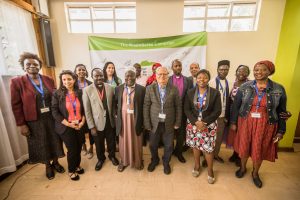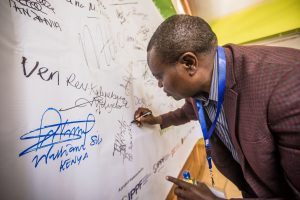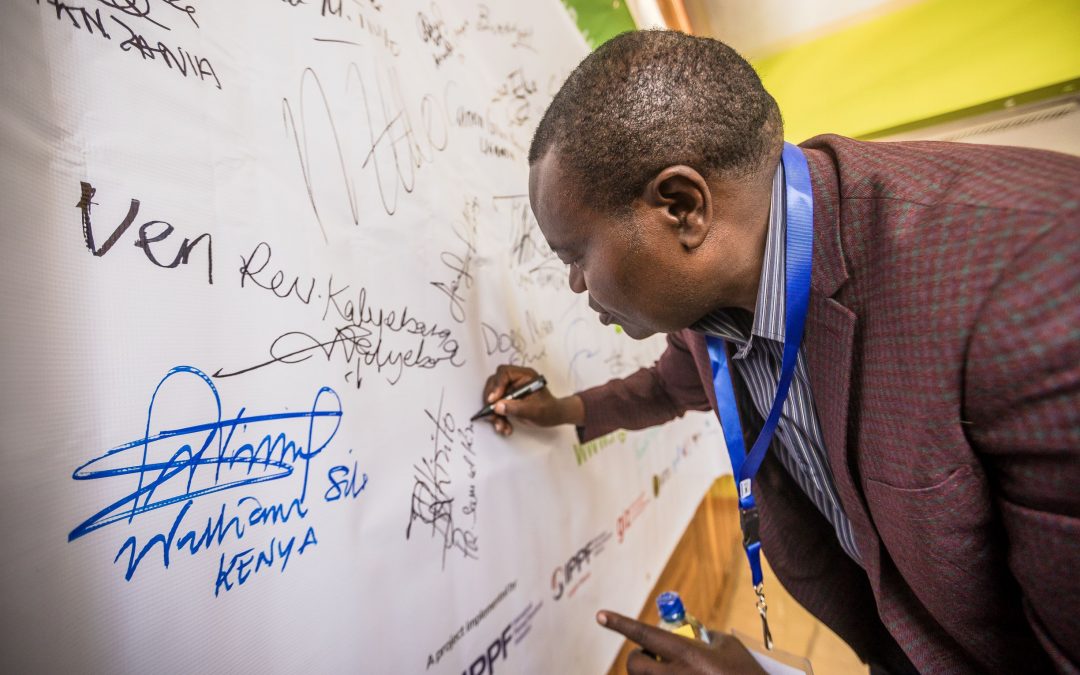**Please also see our playlist of faith leaders talking about family planning below.
Interfaith leaders in Africa are no longer on the periphery of health issues that affect the continent. Their commitment and actions to catalyze the health and development outcomes for Africa can be felt making waves across the continent.
We have a critical role to play on issues that impact on the well-being of human life; a mandate that is not self-generated, but God given; to fulfil the aspirations of Prophet Mohammed and the aspirations of Jesus Christ that people would live in fullness of life
Reverend Grace Canon Kaiso, Chairperson Faith to Action Network.
 Rev. Kaiso was speaking during a convention of faith leaders that was held in Nairobi recently. The convention that brought together inter-faith leaders and Faith Based Organizations across Africa aimed at building capacities of faith organizations and their leadership with skills in order to promote the welfare of women, men and children of the continent.
Rev. Kaiso was speaking during a convention of faith leaders that was held in Nairobi recently. The convention that brought together inter-faith leaders and Faith Based Organizations across Africa aimed at building capacities of faith organizations and their leadership with skills in order to promote the welfare of women, men and children of the continent.
Over time, faith leaders have made progress and created space for themselves in the family planning arena, in a responsible way. They not only contribute constructively to debates but also offer solutions. For instance, during the 5th International conference on family planning (ICFP) that took place in Kigali last year, they expressed support for family planning and committed to continue providing quality FP services that would ensure all communities survive and thrive.
“Faith leaders are very powerful in influencing groups of people, anything they say will be adhered to. We, as Faith to Action Network, have chosen to empower faith leaders with the right skills and correct information, increase their knowledge and understanding of what happens when people use family planning methods. We walk with the faith leaders to find supporting scriptures from their Holy Books, such as Noble Quran or Holy Bible, because if it appears as replication of what the world says then it becomes very difficult to accept the message. But when we present family planning as an obligation to God then faith leaders realize that they have a duty and responsibility to ensure their congregants are given the correct information” Said,
Pastor Samuel Kizito, Seventh Day Adventist Church Union, Uganda, at the Nairobi convention.
Pastor Howard Kasiya, National Health Commission Coordinator, Evangelical Association of Malawi pointed out that contraceptives have been the main issue because in the minds of most religious leaders, they believe that a contraceptive disrupts a fertilized egg. To them, every contraceptive is seen as causing abortion. Training has been an entry point for faith leaders to understand what happens when people use contraceptives, thus, removing the misconceptions surrounding contraceptives.
 According to the State of African Women Report 2018, one in three women in Africa experience gender based violence; one in four women and girls in Africa is married before the age of 18; more than half of maternal deaths worldwide occur in Sub-Saharan Africa and about five African married women have an unmet need for contraception. Every year, an estimated 1.4 million unsafe abortions take place among girls aged 15-19 in Africa whereas seven out of ten people living with HIV in 2016 lived in Sub-Saharan African region-25.6Million people. These are startling statistics that faith leaders choose not to ignore.
According to the State of African Women Report 2018, one in three women in Africa experience gender based violence; one in four women and girls in Africa is married before the age of 18; more than half of maternal deaths worldwide occur in Sub-Saharan Africa and about five African married women have an unmet need for contraception. Every year, an estimated 1.4 million unsafe abortions take place among girls aged 15-19 in Africa whereas seven out of ten people living with HIV in 2016 lived in Sub-Saharan African region-25.6Million people. These are startling statistics that faith leaders choose not to ignore.
At the convention, faith leaders signed up as RightByHer champions in respective communities that they work in. “While Africa believes that women are the mothers of the nation, somehow the way we treat them is not consistent with the kind of value we pose. Today we renew our commitment to stand alongside women and girls” Said Rev Kaiso, as he led the signing up of the #RightByHer campaign session.
RightByHer contributes to securing, realizing and extending women’s rights enshrined in African Union policies in Sub-Saharan African countries. RightByHer mobilizes the social power of community champions, such as faith leaders, to influence legal and social norms on women’s rights through greater transparency and public pressure on duty bearers. The champions also hold decision makers to account for their policy commitments on women’s rights through a stronger civil society voice and meaningful participation in decision making. The State of African Women is a three-year project funded by the European Union and implemented by partners such as IPPF, Faith to Action Network, YWCA and OAFLAD among others.
by Lorna Andisi
We are happy to share our playlist of faith leaders talking about family planning here:

